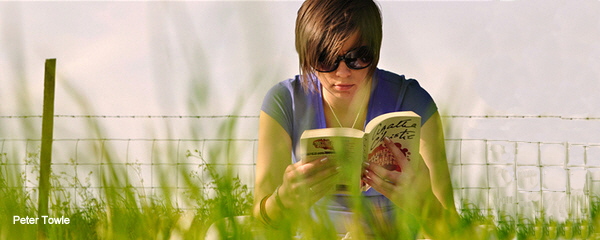
photo by Peter Towle
by Tess St. Clair-Ford
We’re often told that all good fiction stems from conflict, and I think there’s a tendency amongst us writers to misinterpret that, writing characters full of misery. I appreciate lesson one of creative writing: what’s at stake for your character? There needs, undoubtedly, to be an urgency or a direction for characters – otherwise the writing can be stultifying. Never is this truer than in the short story genre, where in conventional terms things have to move forwards at what can be, for the writer, neck breaking speed.
So what about happy characters? Are they, necessarily, boring to read? Is there a lack of conflict in contentment which makes it off-limits as a subject for the short story writer? There’s something rebellious in me that says, why always conflict? I want to write about happiness! I want to describe a narrative arc where my protagonists make all the right decisions. Would this be dull or, worse, unbearably smug?
We’re all too aware of the satisfying nature of a happy ending but I think the tendency as writers of contemporary fiction is to deal with the dysfunctional, the conflicted, the problematic as more ‘meaty’ topics. In Mike Leigh’s recent (ish) film, Another Year, he centres his character-driven narrative around a happily married couple. Happily married! How can that entertain us? Leigh has always been a nonconformist, but his essentially contented central characters become a locus for their not-so-functional friends, and herein lies the drama of the film. Reviewers have suggested that fans of the film are likely, themselves, to ‘adhere to cosy, conservative domesticity’ as Another Year ultimately uplifts and validates that kind of happiness. Is there anything wrong with that? No, but isn’t it interesting that it is considered nonconformist to deal with people who are normal, happy, contented in their everyday lives?
Writing this, I’m racking my brains for examples of happy characters in fiction. I think of smug protagonists who are dealt their come-uppance, or others who struggle to overcome obstacles before achieving a happy ending. Maybe – instead of being a soft option – happiness is actually too hard to write about; too ephemeral a thing to portray ‘truthfully’ in fiction? But isn’t it the perfect source of the light and shade we hope to find in writing – not of conflict, but of colour, of experience. I shall keep trying, I think, to write that happy character. To deal with something that we all strive for, and to see through conflict to find a certain contentment instead.


Hi Tess. If you haven’t already read Ethan Canin, I would recommend his collection – Emperor of the Air. He is a gifted writer, not least because he conjures moments of happiness that are all the more powerful for arriving unexpectedly, surprising the reader … He also writes characters who are okay with the world, but certainly not dull.
Hi Tess,
Thanks for this thought provoking piece. I almost agree with Alison’s sister except that reading a number of short stories in a row ‘exhausts’ me. I figure that’s because of the intensity that is produced by distilling everything into a short piece. Sometimes I just have to put down the journal or anthology and just breathe!
I would also like to write happy characters but they just never seem to be that convincing… I wonder why that is.
Cheers,
Deb
Thanks for the reading recommendations – I’ll be sure to take a look. You’re right, Alison, there’s something delicious about humour in short stories (another thing I aspire to being able to write!) and certainly produce happiness even if not portraying it… And as Pauline says, something about suffering throws contentment, even the idea of contentment, into sharper relief – powerful stuff in the short story form. Lots to think about, thanks!
Terrific piece, Tess. I agree. It's a tricky one. My sister says that reading too many short stories depresses her, and I do get what she's talking about.
But for me, there are many great stories like Carver's 'Cathedral' and 'A Small Good Thing' that lead us towards endings that are powerfully and unexpectedly redemptive - unexpected because of the dark or troubled moments we have already experienced in the story. I suppose that kind of story is my favourite these days. The sense of contentment is hard won, and it's possibly been arrived at via the mundane, but it's all the more moving for me because of that.
Off the top of my head, two stories come to mind that take happiness as their subjects: Carol Shield's 'Home' and Michel Faber's 'Vanilla Bright like EminEm', which starts with the line 'Don, son of people no longer living, husband of Alice, father of Drew and Aleesha, is very, very close to experiencing the happiest moment of his life.' It's one of my favourites. (You can read the whole thing here if you like: http://www.prospectmagazine.co.uk/2004/01/vanillabrightlikeeminem/ . )
Of course great comic stories also spring from conflict and yet can achieve 'uplift' (rather than misery). Primo Levi's 'The Great Mutation' comes to mind.
But I think the short story form - comic, tragic or absurd - is ultimately a subversive one, a form that 'works' society's margins, cracks and undersides - while the novel takes on society itself and threats to deep social values.
Now this isn't happiness as such, I know, but there's also something to do with 'pleasure' in the very fabric of short story form. Perhaps it's in the intensity of the form, its secret 'charge', its sense of surprise, and the musicality of its prose (as different as that music will be from story to story). But more than even these things, there can be such sweetness. Stories give the 'hit' of the revelatory moment, and sometimes, with that, even a sense of the sacred. At the same time, the best retain a sense of mystery.
I agree entirely. Short fiction might not be the most natural vehicle for the subject of happiness, but I think short stories can, in skilled hands, be indescribably tender, utterly lovely and (to throw in another unnecessary adverb) profoundly moving.
You're not alone though with your questions re. happiness... I believe Ian McEwan has said in interview that he turned away from the dark worlds of his early short stories because, among other things, he wanted to write about the often neglected experience of happiness: domestic, marital, familial, etc. Certainly this feels to me like part of the drive behind his novel Saturday. Maybe the form of the novel lends itself to happiness better - though, saying that, the thing I truly love about the short story form is its endless versatility.
Sorry – I mistakenly posted my comment before I’d finished writing it…
I was going to say that Bertha is hysterically happy – ‘absurd’ in her own words – which builds extraordinary tension as the story progresses. We sense that her happiness is not destined to last. So, interestingly, the happiness, the ‘bliss’, is in itself a form of conflict.
Just re-read the story. Absolutely brilliant! Thanks again for the post.
Enjoyed your piece, thank you, Tess. It has set me thinking about ‘happy’ characters in short stories and you’re right, of course, it’s a struggle to find examples. Even Bertha, in Katherine Mansfield’s Bliss,
I admire Tess’s ambition to capture contentment. I’ve often thought myself that happiness is very difficult thing to successfully evoke in fiction without appearing trite or overly sugary.
I must admit that when I try to think of truly contented characters from fiction it seems to be children’s literature that supplies all my examples. Paddington Bear, Moomins and the children in Swallows & Amazons. Even that most famously miserable of characters, Eeyore, manages to attain a simple contentment just by being presented with an empty honeypot and a burst balloon for his birthday (using them as a ‘useful pot’ and something to put inside it). Perhaps children’s fiction is less embarassed about being set in truly happy worlds with comfortable, cosy people and creatures.
Some of my favourite short stories for adults, for example those by Carson McCullers, feature a great deal of discontentment, But, for me, this seems to throw those moments of contentment, when they do occur, into sharper contrast.